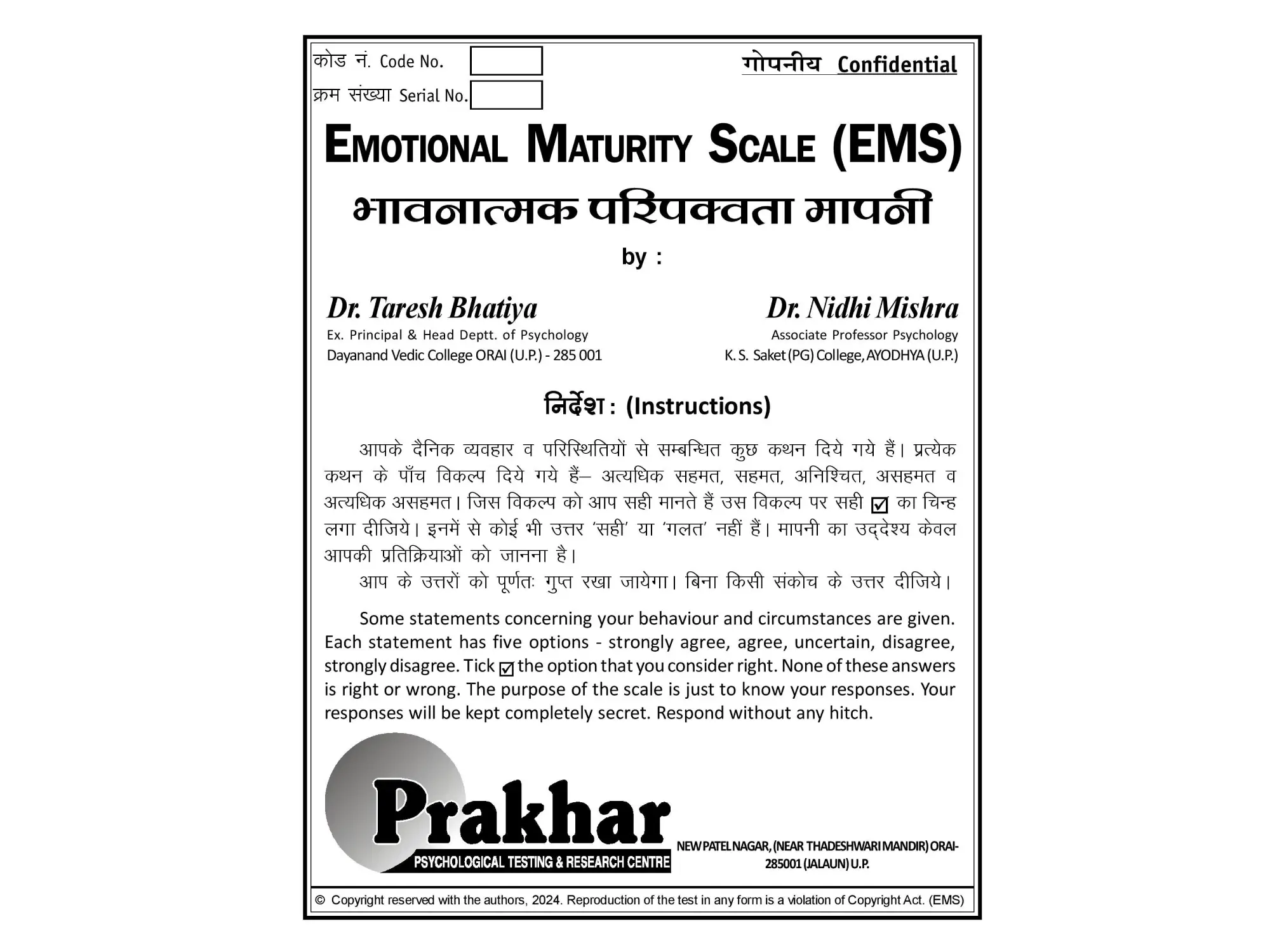
Emotional Maturity Scale (EMS)
Age Range
16-65 years
Language
English, Hindi
Items
50 items
Price Range
₹1,550 - ₹6,200
Select Pack Size
Description
The Emotional Maturity Scale (EMS) is a comprehensive psychometric tool designed to assess an individual's emotional maturity across seven essential dimensions. Developed by Taresh Bhatia & Nidhi Mishra, this scale provides a detailed evaluation of emotional development and maturity in individuals aged 16 to 65 years. The scale is available in both Hindi and English (Bilingual), ensuring accessibility for diverse populations, and demonstrates high reliability and validity. Seven Key Areas Measured by the Emotional Maturity Scale: 1. Self-Awareness: This dimension assesses an individual's ability to recognize and understand their own emotions, thoughts, and behaviors. Self-awareness is fundamental to emotional maturity, as it enables individuals to identify their emotional states, triggers, and patterns. High scores in this area indicate a strong capacity for introspection and self-reflection, which are crucial for personal growth and emotional regulation. 2. Emotional Regulation: This area measures the ability to manage and control emotional responses effectively, especially in challenging or stressful situations. Emotional regulation involves the capacity to modulate emotions, maintain emotional balance, and respond appropriately rather than react impulsively. Individuals with high scores demonstrate resilience and the ability to navigate emotional challenges with composure. 3. Motivation: This dimension evaluates intrinsic motivation, goal-setting, and the drive to achieve personal and professional objectives. Emotional maturity includes the ability to maintain motivation despite setbacks and to channel emotions productively toward achieving goals. High scores reflect self-motivation, perseverance, and a positive approach to challenges. 4. Empathy & Social Skills: This area assesses the capacity to understand and share the feelings of others, as well as the ability to interact effectively in social situations. Empathy involves recognizing and responding to others' emotional states, while social skills encompass communication, relationship-building, and conflict resolution. High scores indicate strong interpersonal abilities and emotional intelligence in social contexts. 5. Personal Responsibilities: This dimension measures the ability to take ownership of one's actions, decisions, and their consequences. Emotional maturity includes accepting responsibility for personal choices, learning from mistakes, and being accountable. High scores reflect a mature approach to personal accountability and the ability to handle responsibilities effectively. 6. Adaptability & Flexibility: This area evaluates the capacity to adjust to changing circumstances, cope with uncertainty, and remain flexible in the face of challenges. Adaptability is a key component of emotional maturity, as it enables individuals to navigate life's transitions and unexpected situations with resilience. High scores indicate the ability to adapt to new environments, situations, and demands without excessive stress. 7. Sense of Humor: This dimension assesses the ability to maintain perspective, find lightness in difficult situations, and use humor as a coping mechanism. A healthy sense of humor is associated with emotional maturity, as it reflects the ability to maintain balance, reduce stress, and approach challenges with a positive outlook. High scores indicate the capacity to use humor appropriately and maintain emotional well-being. Scoring and Interpretation: The Emotional Maturity Scale provides a comprehensive profile of an individual's emotional development across all seven dimensions. Scores are calculated for each area as well as for overall emotional maturity. • High Scores: High scores across dimensions indicate well-developed emotional maturity, suggesting that the individual has strong emotional intelligence, self-awareness, and the ability to navigate life's challenges effectively. • Moderate Scores: Moderate scores may indicate areas where further development is possible, highlighting opportunities for growth in specific emotional maturity dimensions. • Low Scores: Lower scores in specific areas may suggest areas where the individual could benefit from support, counseling, or targeted interventions to enhance emotional maturity. Practical Applications: The Emotional Maturity Scale is valuable for: 1. Personal Development: Individuals can use this scale to gain insights into their emotional maturity, identifying strengths and areas for growth. 2. Counseling and Therapy: Mental health professionals can utilize this scale to assess emotional development and design targeted interventions for clients. 3. Educational Settings: Educators and counselors can use this scale to support students' emotional development and identify those who may benefit from additional support. 4. Workplace and Organizational Development: Employers can use this scale to assess emotional maturity in employees, supporting professional development and team dynamics. 5. Research: Researchers can utilize this scale to study emotional maturity across different demographics, age groups, and contexts. Counseling Implications: When low or moderate scores are identified in specific areas, counseling or support may be recommended to enhance emotional maturity. Interventions may include: • Emotional Intelligence Training: To improve self-awareness and emotional regulation. • Social Skills Development: To enhance empathy and interpersonal abilities. • Stress Management and Coping Strategies: To improve adaptability and resilience. • Personal Growth Programs: To support overall emotional development and maturity. The Emotional Maturity Scale (EMS) thus serves as a comprehensive tool for assessing emotional development, providing valuable insights that can guide personal growth, counseling interventions, and support systems to enhance overall emotional well-being and maturity.